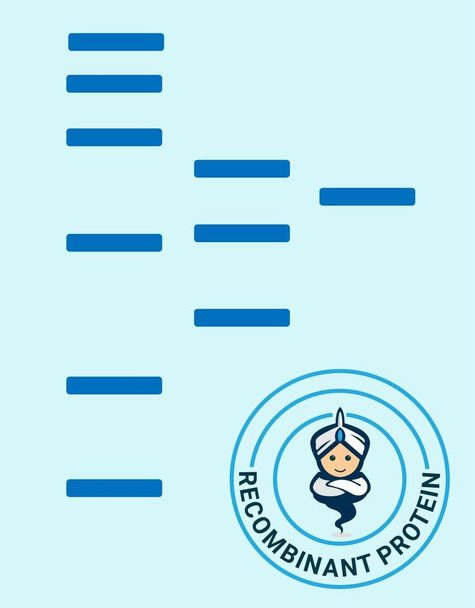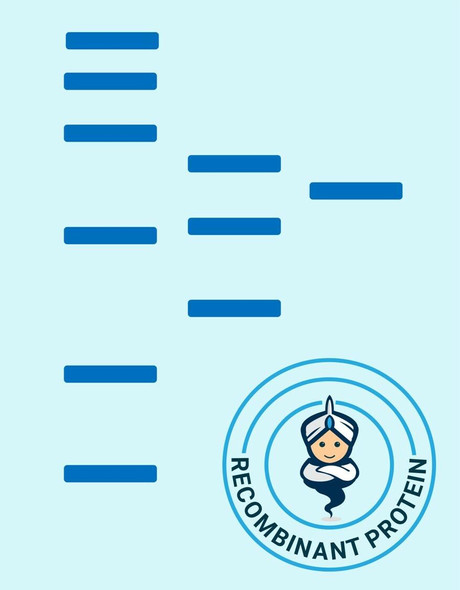Growth Factors & Cytokines Recombinant Proteins
Human MCSFR Recombinant Protein (RPPB0757)
- SKU:
- RPPB0757
- Product Type:
- Recombinant Protein
- Species:
- Human
- Uniprot:
- P07333
- Research Area:
- Growth Factors & Cytokines
Description
| Product Name: | Human MCSFR Recombinant Protein |
| Product Code: | RPPB0757 |
| Size: | 5µg |
| Species: | Human |
| Target: | MCSFR |
| Synonyms: | Macrophage colony-stimulating factor 1 receptor, CSF-1 receptor (EC:2.7.10.1), CSF-1-R, CSF-1R, M-CSF-R, Proto-oncogene c-Fms, CD115, CSF1R, FMS.� |
| Source: | Sf9 Insect cells |
| Physical Appearance: | Sterile filtered colorless solution. |
| Formulation: | MCSFR protein solution (0.25mg/ml) contains Phosphate Buffered Saline (pH 7.4) and 10% glycerol. |
| Stability: | Store at 4°C if entire vial will be used within 2-4 weeks. Store, frozen at -20°C for longer periods of time. For long term storage it is recommended to add a carrier protein (0.1% HSA or BSA).Avoid multiple freeze-thaw cycles. |
| Purity: | Greater than 90.0% as determined by SDS-PAGE. |
| Amino Acid Sequence: | IPVIEPSVPE LVVKPGATVT LRCVGNGSVE WDGPPSPHWT LYSDGSSSIL STNNATFQNT GTYRCTEPGD PLGGSAAIHL YVKDPARPWN VLAQEVVVFE DQDALLPCLL TDPVLEAGVS LVRVRGRPLM RHTNYSFSPW HGFTIHRAKF IQSQDYQCSA LMGGRKVMSI SIRLKVQKVI PGPPALTLVP AELVRIRGEA AQIVCSASSV DVNFDVFLQH NNTKLAIPQQ SDFHNNRYQK VLTLNLDQVD FQHAGNYSCV ASNVQGKHST SMFFRVVESA YLNLSSEQNL IQEVTVGEGL NLKVMVEAYP GLQGFNWTYL GPFSDHQPEP KLANATTKDT YRHTFTLSLP RLKPSEAGRY SFLARNPGGW RALTFELTLR YPPEVSVIWT FINGSGTLLC AASGYPQPNV TWLQCSGHTD RCDEAQVLQV WDDPYPEVLS QEPFHKVTVQ SLLTVETLEH NQTYECRAHN SVGSGSWAFI PISAGAHTHP PDEFLFTPLE PKSCDKTHTC PPCPAPELLG GPSVFLFPPK PKDTLMISRT PEVTCVVVDV SHEDPEVKFN WYVDGVEVHN AKTKPREEQY NSTYRVVSVL TVLHQDWLNG KEYKCKVSNK ALPAPIEKTI SKAKGQPREP QVYTLPPSRD ELTKNQVSLT CLVKGFYPSD IAVEWESNGQ PENNYKTTPP VLDSDGSFFL YSKLTVDKSR WQQGNVFSCS VMHEALHNHY TQKSLSLSPG KHHHHHH |
| Biological Activity: | Measured by its ability to inhibit M-CSF dependent�proliferation of M-NFS-60 mouse myelogenous leukemia lymphoblast cells.�The ED50 for this effect is less or equal to 100ng/ml in the presence of 10�ng/ml M-CSF. |
MCSFR which is also familiar as CSF1R, is part of the type3 subfamily of receptor tyrosine kinases. MCSFR is expressed mainly on cells of the monocyte and macrophage lineage, stem cells, and in the growing placenta. Most of the biological effects of this cytokine are mediated by MCSFR. MCSFR contains an extracellular ligand-binding domain, a single membrane-spanning segment, and an intracellular tyrosine kinase domain. Originally CSF1 and this receptor were implicated as vital for normal trophoblastic implantation as well as monocyte development. The role of CSF1/CSF1R in normal mammary gland development is actually very interesting since this connection has also been discovered in the biology of breast cancer with the results of abnormal expression of CSF1 and its receptor. Likewise, in Alzheimer's disease and after brain injuries an increased level of CSF1R was found in the microglia, which causes the microglia to become more active.
MCSFR produced in Sf9 Baculovirus cells is a single, glycosylated polypeptide chain containing 737 amino acids (20-517a.a.) and having a molecular mass of 82.1kDa. (Molecular size on SDS-PAGE will appear at approximately 70-100kDa).MCSFR is expressed with a 239 amino acid hIgG-His tag at C-Terminus and purified by proprietary chromatographic techniques.
| UniProt Protein Function: | CSFR: an oncogenic tyrosine kinase receptor for CSF-1 (M-CSF). Drives growth and development of monocytes. Binding of CSF-1 induces receptor dimerization, activation and autophosphorylation of cytoplasmic tyrosine residues used as docking sites for SH2-containing signaling proteins. There are at least five major tyrosine autophosphorylation sites. Two point mutations seen in 10-20% of patients with acute myeloid leukemia, chronic myelomonocytic leukemia or myelodysplasia. One mutation appears to be both somatic and germline, and disrupts Cbl binding and receptor turnover. v-fms lacks the Cbl binding site and causes feline leukemia. Mutations may also develop after chemotherapy for lymphoma. A distinct point mutation was found in some cases of hepatocellular carcinoma and related to increased expression, and another mutation was found in 2 of 40 patients with idiopathic myelofibrosis. Expression is elevated in breast tumors and cell lines, and expression in xenografts and transgenic mice has been correlated with xenograft growth and breast cancer development. Inhibitors: Ki-20227 and other Kit/PDGFR inhibitors. |
| UniProt Protein Details: | Protein type:Kinase, protein; Membrane protein, integral; EC 2.7.10.1; Protein kinase, tyrosine (receptor); Oncoprotein; Protein kinase, TK; TK group; PDGFR family Chromosomal Location of Human Ortholog: 5q32 Cellular Component: cell surface; integral to plasma membrane; intracellular; plasma membrane Molecular Function:ATP binding; cytokine binding; macrophage colony stimulating factor receptor activity; protein homodimerization activity; protein phosphatase binding Biological Process: axon guidance; cell proliferation; cytokine and chemokine mediated signaling pathway; forebrain neuron differentiation; hemopoiesis; inflammatory response; innate immune response; intercellular junction maintenance; macrophage differentiation; monocyte differentiation; multicellular organismal development; negative regulation of apoptosis; negative regulation of cell proliferation; olfactory bulb development; osteoclast differentiation; peptidyl-tyrosine phosphorylation; phosphatidylinositol metabolic process; phosphoinositide-mediated signaling; positive regulation of cell migration; positive regulation of cell proliferation; positive regulation of osteoclast differentiation; positive regulation of protein amino acid phosphorylation; positive regulation of tyrosine phosphorylation of Stat3 protein; protein amino acid autophosphorylation; regulation of bone resorption; regulation of cell shape; ruffle organization and biogenesis; signal transduction; skeletal muscle development; transmembrane receptor protein tyrosine kinase signaling pathway Disease: Leukoencephalopathy, Diffuse Hereditary, With Spheroids |
| NCBI Summary: | The protein encoded by this gene is the receptor for colony stimulating factor 1, a cytokine which controls the production, differentiation, and function of macrophages. This receptor mediates most if not all of the biological effects of this cytokine. Ligand binding activates the receptor kinase through a process of oligomerization and transphosphorylation. The encoded protein is a tyrosine kinase transmembrane receptor and member of the CSF1/PDGF receptor family of tyrosine-protein kinases. Mutations in this gene have been associated with a predisposition to myeloid malignancy. The first intron of this gene contains a transcriptionally inactive ribosomal protein L7 processed pseudogene oriented in the opposite direction. Alternative splicing results in multiple transcript variants. [provided by RefSeq, Dec 2013] |
| UniProt Code: | P07333 |
| NCBI GenInfo Identifier: | 547770 |
| NCBI Gene ID: | 1436 |
| NCBI Accession: | P07333.2 |
| UniProt Secondary Accession: | P07333,Q6LDW5, Q6LDY4, Q86VW7, B5A955, D3DQG2, |
| UniProt Related Accession: | P07333 |
| Molecular Weight: | 33,248 Da |
| NCBI Full Name: | Macrophage colony-stimulating factor 1 receptor |
| NCBI Synonym Full Names: | colony stimulating factor 1 receptor |
| NCBI Official Symbol: | CSF1R�� |
| NCBI Official Synonym Symbols: | FMS; CSFR; FIM2; HDLS; C-FMS; CD115; CSF-1R; M-CSF-R�� |
| NCBI Protein Information: | macrophage colony-stimulating factor 1 receptor |
| UniProt Protein Name: | Macrophage colony-stimulating factor 1 receptor |
| UniProt Synonym Protein Names: | CSF-1 receptor (EC:2.7.10.1); CSF-1-R; CSF-1R; M-CSF-R; Proto-oncogene c-Fms; CD_antigen: CD115 |
| Protein Family: | Macrophage colony-stimulating factor 1 receptor |
| UniProt Gene Name: | CSF1R�� |
| UniProt Entry Name: | CSF1R_HUMAN |






